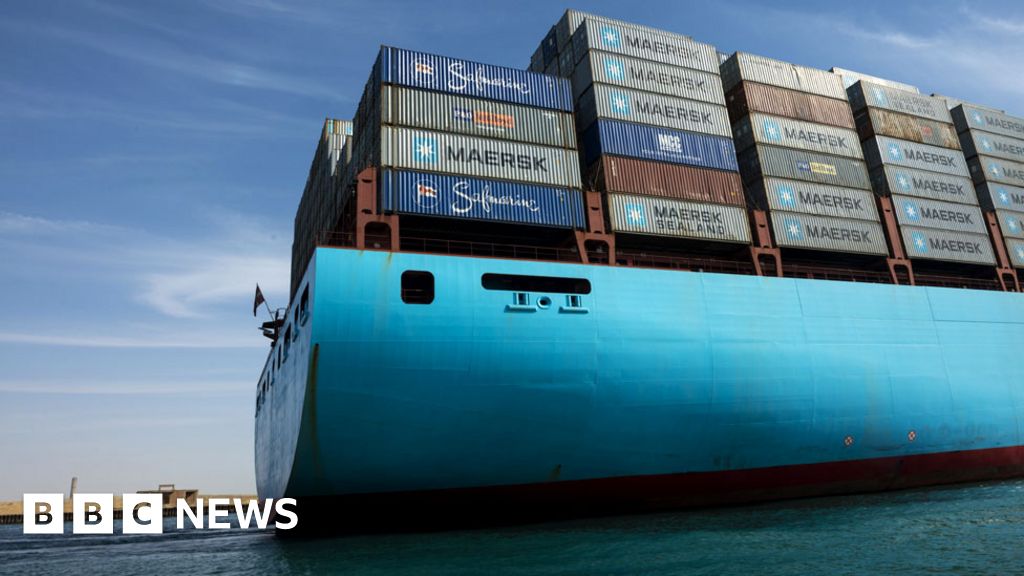- By Nick Edser
- Business reporter
Image source, Getty Images
Attacks on commercial ships in the Red Sea risk pushing up the price of oil and other goods, analysts have warned.
Several firms have paused shipments through the route after vessels were attacked by Houthi rebels in Yemen.
The world’s second largest shipping line, Maersk, said on Tuesday that it will reroute some of its vessels around Africa’s Cape of Good Hope.
The disruption has led the US to launch an international naval operation to protect ships in the Red Sea route.
Countries joining the security group include the UK, Canada, France, Bahrain, Norway and Spain.
US defence secretary Lloyd Austin said: “The recent escalation in reckless Houthi attacks originating from Yemen threatens the free flow of commerce, endangers innocent mariners, and violates international law.”
The Red Sea is one of the world’s most important routes for oil and liquefied natural gas shipments, as well as for consumer goods. It is bookended by the Bab al-Mandab Strait – also known as the Gate of Tears – in the south and the Suez Canal in the north.
Oil giant BP said on Monday that it would temporarily pause all shipments of crude through the key trade route. Rival energy giant Shell has yet to comment on the situation.
The alternative route, round the Cape of Good Hope, adds about 3,500 nautical miles to the journey and takes about 10 days longer.
At the moment, changes to the oil price have been minimal. Prices rose 1% on Monday, but on Tuesday they were little changed with benchmark Brent crude trading at around $78 a barrel.
However, Richard Meade, editor-in-chief of shipping newspaper Lloyd’s List, told BBC Radio 4’s Today programme: “What is going to be very interesting is if the tankers continue reroute and obviously yesterday saw BP start to reroute some of their ships around the Cape of Good Hope as well.
“That’s a much more finely balanced market that could have serious implications for the global supply chain.”
But rerouting will affect more than just oil. “You’re talking about 12% of global trade is taken through the Red Sea, that’s about $1 trillion worth of goods annually,” Mr Meade said.
“We’ve seen most of the main container carriers – these are the ones that carry finished goods, TVs, electronics, trainers – they have almost exclusively started rerouting”
Marco Forgiona, the director general at the Institute of Export and International Trade, told the BBC that rerouting would increase fuel and insurance costs for shipping, “and then you’ve got the issue that the ships are in the wrong place, the containers are in the wrong place and you get the potential for congestion at the ports and further delays”.
S&P Global Market Intelligence said that nearly 15% of goods imported into Europe, the Middle East and North Africa were shipped from Asia and the Gulf by sea. That includes 21.5% of refined oil and more than 13% of crude oil.
A rise in oil prices can lead to higher inflation, which measures the pace of price rises. Inflation has been falling in the UK and is currently 4.6%.
New figures out on Wednesday will show whether it has continued to drop but, at the current level, it is still more than twice the Bank of England’s 2% target. The Bank has, until recent months, been raising interest rates to cool inflation.
Houthi rebels have declared their support for Hamas and have said they are targeting ships travelling to Israel, using drones and rockets against foreign-owned vessels.
However, some firms, such as Investor Chemical Tankers, whose MT Swan Atlantic vessel was attacked on Monday, said that their ship had no links to Israel, which is at war with Hamas following the attacks on 7 October.
Sal Mercogliano, a naval historian at Campbell University, told the BBC that ships were waiting to see what level of security they would to get.
“The ballistic missiles are really the tough one. This is the first time we’ve ever seen ships hit by this type of weapon,” he said.
“It’s a very difficult type of missile to shoot down. And very few ships have that capability to do that. And if that’s the threat that the ships are facing, many shipping companies may decide not to go that way.”

Robert Johnson is a UK-based business writer specializing in finance and entrepreneurship. With an eye for market trends and a keen interest in the corporate world, he offers readers valuable insights into business developments.






